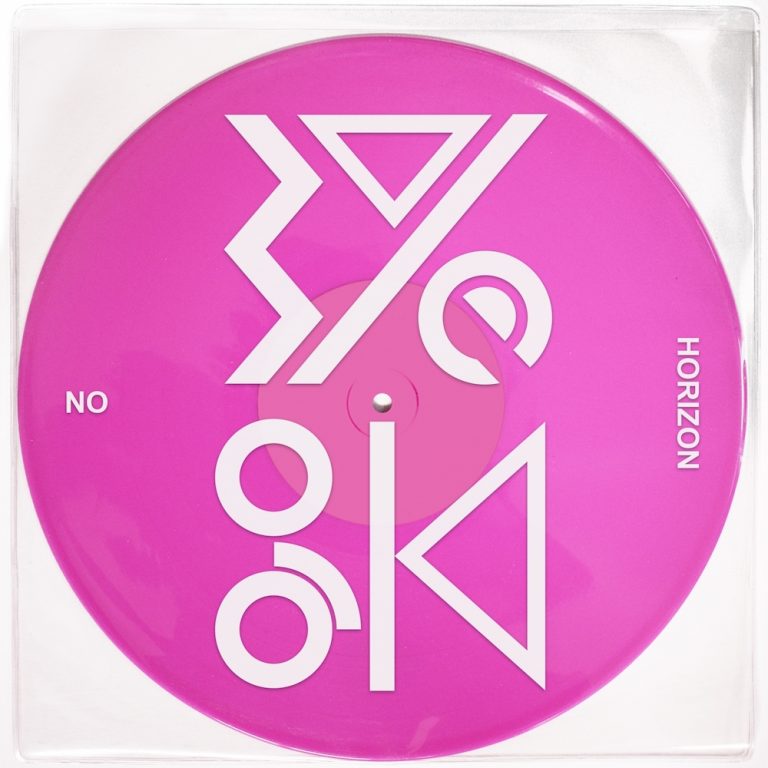The children’s choir is somewhat of a novelty in indie rock. When it does appear, it’s usually to add an embellishment or create a childlike affectation, employed as a quirky addition to a single track on an album. Rarely is a children’s choir treated as a sophisticated entity worthy of a full project’s worth of exploration. Fortunately, Wye Oak is not a typical indie rock band, and the Brooklyn Youth Chorus is not a typical children’s choir either. The five songs that make up No Horizon were born out of a live collaboration between the two groups that closed out the 2019 Ecstatic Music Festival in New York. The young choristers’ bright, buoyant singing brings an airy freshness to this singular set of synth-laden art-pop songs, a well-suited sonic palette for Jenn Wasner’s thoughtful musings on contemporary life.
Opener “AEIOU” explores language. The track begins with the choir chanting these vowels over a grounding of chirpy synths and percussion, gradually introducing harmony and polyphony as they elevate a meaningless string of letters into an intriguing musical statement. A few shimmery guitar strums introduce Wasner’s vocals: “If you speak my name / Use my real name / The one I gave myself.” Later she observes “a word can suggest my likeness,” but not without noting the limitations inherent in such descriptors: “But mountains are not pictures of mountains / Or the letters that spell the word / In the language we are speaking.” But her message is not a pessimistic one, as she suggests the existence of a kind of universal understanding that perhaps transcends language: “The foundation and its meaning / Does not crumble underfoot / For those who do not have the word.” Wasner’s usage of words themselves to convey such ideas leaves you with quite a bit to ponder as the choir returns, allowing the vowels to seemingly dance through musical space into formations of their own.
The following track, “No Place”, is more percussive, with an uneven groove that creates a sense of unrest matching the tone of its lyrics: “We live in a place / That is no place / We breathe in our words / When we are hungry / We eat our ideas.” Wasner and the choir deliver these lines in a call-and-response fashion, alternating singing and speaking in a way that feels eerily robotic. Three lines from the second verse—“Afraid of getting sick / We do not kiss / We do not shake hands”—may have been written over a year ago, but have an uncanny prescience that is not lost on the listener. Towards the end of the track, Wasner and the choir join their voices together: “We do not lock eyes with a stranger / And ask them / Who are you? Who am I? Where are we? What’s happened to us?” With these questions, the whole atmosphere of the song changes; a steady pulse underlies a wistful piano loop as the singers repeat these phrases and overlap their harmonies, bringing to a life a hypothetical, less lonely world.
The light, glimmering textures of the choir complement the synth-heavy instrumentals beautifully, at moments creating a certain kind of pristine magic. “I can see it all now,” Wasner proclaims on centerpiece “Spitting Image”, and when the choir joins her with its sparkling harmonies, you really believe it. This is especially apparent on closer “Sky Witness”. After a dream-like introduction in which Wasner sings of “trees in the wind tapping Morse code,” and “the face of the moon marked with messages in a hidden language,” the song suddenly changes as the choir brings shape to a new set of words: “Who is speaking? / Hidden language / Cloud appearing / Someone watching.” Out of context, such words could be a signifier of anxiety or paranoia, but the choir brings an unequivocal sense of wonder to them. “If I do not have a witness,” sings Wasner in unison with the choir, “I will create one from the sky.” In the EP’s final moments, the choir mimics the vibrations of the guitar and swooping synths as they repeat a few simple words, now with a world of meaning behind them: “Cloud / Moon / See me.”
The collaborative magic of the choir is something we’ve had to live largely without since the pandemic began, and likely isn’t coming back anytime soon. No Horizon captures that magic beautifully, reminding us of its existence, and even transmitting it to those who might not have experienced it before. It’s a fitting way to flesh out Wasner’s reflections on communication and isolation, which feel particularly relevant and profound in our present moment. The comforting conclusion that we are never as truly alone as we may feel is just as apparent in Wasner’s words as it is in the choir’s glistening arrangements.

